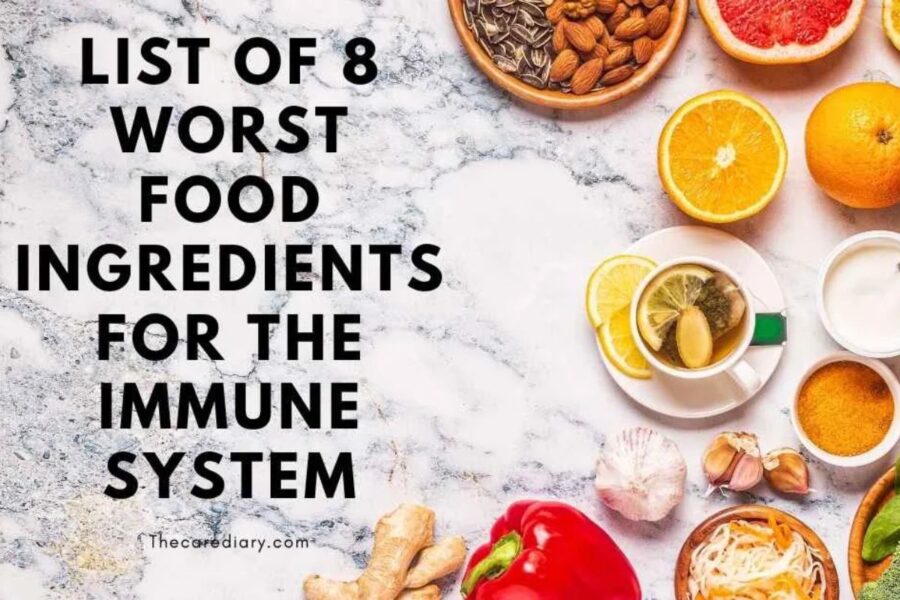Your diet has an impact on how you feel and how well your body works.
While a well-balanced, nutrient-dense diet benefits your immune system, a diet low in nutrients and heavy in ultra-processed foods weakens immune function.
It is critical that we pay attention to our immunity in times like these when COVID-19 cases are on the rise. A healthy immune system not only keeps the body from getting sick but also helps it fight infections if it does. While you may be attempting to boost your immunity, we have compiled a list of the worst food ingredients for immune system that might unintentionally weaken your immune function.
This article lists the 8 worst food ingredients for the immune system.
1. Added Sugar
There’s no denying that decreasing your intake of added sugar benefits your general health and immunological function.
Foods that boost blood sugar levels considerably, such as those high in added sugars, promote the synthesis of inflammatory proteins such as tumour necrosis factor-alpha (TNF-), C-reactive protein (CRP), and interleukin-6 (IL-6), all of which have a detrimental impact on immunological function.
This is especially important for diabetics, who might have increased blood sugar levels for longer periods of time than persons with well-controlled blood sugar levels.
Furthermore, high blood sugar levels may limit the response of neutrophils and phagocytes, two kinds of immune cells that aid in infection defence.
High blood sugar levels have also been proven to damage gut barrier function and cause gut flora imbalances, which can affect your immune response and make you more susceptible to infection.
In a 2012 study of 562 older persons, researchers discovered that those with high blood sugar had poorer immune responses and higher levels of the inflammatory marker CRP.
Much additional research has connected high blood sugar levels to a weakened immune response in both diabetics and non-diabetics.
Furthermore, in some cultures, diets rich in added sugar may increase vulnerability to autoimmune illnesses such as rheumatoid arthritis.
Limiting your intake of added sugary foods and beverages, such as ice cream, cake, candy, and sugary beverages, will help you enhance your general health and immunological function.
2. Omega-6 Fatty Acid-Rich Foods
Both omega-6 and omega-3 lipids are required for proper bodily function.
Omega-6 fats are abundant in Western diets, but omega-3 fats are scarce. Increased illness risk and perhaps immunological dysfunction have been linked to this imbalance.
Omega-6 fats appear to boost the expression of pro-inflammatory proteins, which may decrease the immune response, whereas omega-3 fats appear to limit the creation of those proteins and improve immunological function.
Furthermore, research on obese persons shows that a high omega-6 fat intake might lead to immunological dysfunction and raise the risk of illnesses like asthma and allergic rhinitis.
However, the link between omega-6 fats and immunological response is complex, and further human study is required (22Trusted Source).
Regardless, doctors recommend that you keep a healthy ratio of omega-6 to omega-3 fats in your diet, which ranges from 1:1 to 4:1, to enhance general health.
This means consuming more omega-3-rich foods like salmon, mackerel, sardines, walnuts, and chia seeds while avoiding omega-6-rich foods such as sunflower canola oil, maize oil, and soybean oil.
3. Salty Foods
High salt diets may cause tissue inflammation and raise the risk of autoimmune illnesses, thus salty foods like chips, frozen meals, and fast food may damage your immune response.
Six healthy males were given 12 grams of salt each day for 50 days in a 2016 research. This was followed by 50 days of ingesting 9 grams of salt per day, followed by a comparable period of consuming 6 grams per day. Finally, they took 12 grams every day for another 30 days.
The males showed increased amounts of white blood cells termed monocytes and inflammatory markers IL-23 and IL-6 on the high salt diet of 12 grams per day. They also showed decreased levels of the anti-inflammatory protein IL-10, which indicated an overactive immune system.
Salt has also been linked to the aetiology of autoimmune illnesses, since it inhibits normal immune function, suppresses anti-inflammatory responses, changes gut flora, and promotes the production of immune cells.
4. Fried Foods
Because of their high oil and fat content, fried meals, as tasty as they are (think French fries and chicken wings), are not the ideal option for strengthening your immune system.
Fried meals are heavy in oil and fat, which might inhibit the immune system, according to Bannan. “A 2016 study found that a high-fat diet has a deleterious influence on the gut flora, which is critical for immune function.”
5. Potato Chips
If you’re attempting to improve your immune system, keep potato chips and other snack items like corn chips and pretzels closed since they’re salted and typically fried.
6. Cookies, And Cakes
When trying to strengthen your immune system, having a sugar craving is not ideal. Foods heavy in fat, calories, and sugar, as we mentioned before, can cause inflammation and weight gain. According to research, “too many baked products can pose a threefold danger to your immune system.”
What to eat instead: According to the dietician, healthy food items like dates, 100 percent whole wheat flour, applesauce, mashed bananas, and even black beans may be used to bake your favourite desserts.
7. Alcohol
While occasional drinking may not be harmful to the body, if you are a chronic drinker who consumes alcohol on a daily or even weekly basis, you should be aware that your favourite glass of liquor is lowering your immunity. Regular alcohol drinking has been shown to have negative effects on immunity, sleep, obesity, liver function, and even the heart.
8. Energy Drinks
Red Bull, Monster, 5-Hour Energy, and other energy drinks aren’t nearly as beneficial to your immune system as a full night’s sleep. Bannan points out that relying on energy drinks to keep you going when you aren’t getting enough sleep might have a negative influence on your immune system.
“Energy drinks are exactly as rich in sugar as sodas, if not greater,” she says. “In addition, energy drinks contain a lot more caffeine, and too much caffeine can cause inflammation in the body.”
The Bottom Line
Maintaining a healthy lifestyle might help your immune system.
This includes avoiding meals and beverages heavy in added sugars and salt, as well as processed meats and fried foods, all of which can harm your immune system.
To help your immune system, eat a well-balanced diet rich in whole, nutrient-dense foods while avoiding ultra-processed foods as much as possible.









